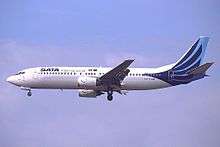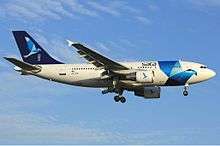Azores Airlines
Azores Airlines, previously known as SATA Internacional,[1] is a Portuguese airline based in the municipality of Ponta Delgada, on the island of São Miguel in the autonomous archipelago of the Azores.[2][3] A subsidiary of SATA Air Açores, the airline operates as the international arm of the regional network, connecting the archipelago with Europe and North America, from its hub at João Paulo II Airport.
| |||||||
| Founded | 1990 | ||||||
|---|---|---|---|---|---|---|---|
| Commenced operations | 1991 | ||||||
| Operating bases | João Paulo II Airport | ||||||
| Focus cities | Lisbon Airport | ||||||
| Frequent-flyer program | SATA Imagine | ||||||
| Fleet size | 5 | ||||||
| Destinations | 20 | ||||||
| Parent company | SATA Air Açores | ||||||
| Headquarters | Ponta Delgada, São Miguel, Azores, Portugal | ||||||
| Key people | António Teixeira, CEO | ||||||
| Website | azoresairlines.pt | ||||||
History
Early years
The airline was first established in December 1990 under the name of OceanAir and in 1991 was authorized to operate air transport services as a non-scheduled carrier. SATA Air Açores became the major shareholder when OceanAir suspended service in 1994. It later became the sole owner, and on 20 February 1998 it was re-branded as SATA Internacional, resuming operations on 8 April 1998. The airline's original livery consisted of an all white fuselage with the name SATA Internacional in ocean blue over the front windows, and a dark blue tail with the company logo.[4] Before this the livery had an idealised logo featuring the bands of crashing waves, superimposed by a sun-disk, with the calligraphic lettering "Fly Azores" below. This tourist-friendly logo was retired at the end of the 20th century, to be replaced with a more corporate image. The airline became a wholly owned subsidiary of Grupo SATA (the parent company).
Following its bid by public tender, SATA Internacional was awarded scheduled routes from Ponta Delgada to Lisbon, Madeira Island and Porto. SATA owns two tour operators in North America: SATA Express in Canada and Azores Express in the United States.[5]
21st century
After May 2009, SATA adopted a new brand image and a new logo which was applied to its first new Airbus A320-200, registered CS-TKO and named "Diáspora". The symbol, called BIA (for "Blue Islands Açor"), consisted of nine geometrical shapes, representing the nine islands of the Azores assembled to form the mythical Açor of Portuguese legend.[6] The "açor" or northern goshawk was thought to have been the bird found circling the islands of the Azores when Portuguese sailors first discovered the archipelago. This form appeared on the tail fin, in addition to a portion located just ahead of the wings on the fuselage. The new scheme was adopted by both SATA Internacional and SATA Air Açores during the fleet upgrades beginning at the end of the 1990s and lasted until 2015.
In January 2015, the airline announced strategic plans to reduce its debts from €179 m to €40 m by 2020 by reducing its fleet and workforce. Under the plan it would also be renamed Azores Airlines.[7]
In October 2015, SATA Internacional subsequently announced a major rebranding including a name change to Azores Airlines and a change of the colour scheme from blue tones to green tones. At the same time, a fleet renewal with Airbus A330 aircraft had been announced.[1] The first A330 commercial flight took place on 25 March 2016 from Ponta Delgada to Boston.[8]
In September 2016, the airline announced a change of plans regarding their fleet renewal. While plans to phase in a second Airbus A330 have been cancelled, Azores Airlines ordered two Airbus A321neo on interim lease for 2017-2019 and four Airbus A321LR which will be delivered in 2019 to replace the interim A321neos.[9] The A310 fleet phase-out was completed in the first months of 2018.
Destinations

_CS-TKK_-_MSN_2390_-_Named_Corvo_(9738930691).jpg)

Azores Airlines operates scheduled flights to the Madeira Islands, mainland Portugal and other destinations in Europe and North America, as well as charter flights. Domestic destinations are covered by its parent company, SATA Air Açores. This is a list of the airports served as of May 2019:[10]
| Country | City | Airport | Notes | Refs |
|---|---|---|---|---|
| Canada | Montréal | Montréal–Pierre Elliott Trudeau International Airport | Seasonal | |
| Toronto | Toronto Pearson International Airport | |||
| Cape Verde | Praia | Nelson Mandela International Airport | ||
| Dominican Republic | Punta Cana | Punta Cana International Airport | Seasonal charter | [11] |
| Germany | Frankfurt | Frankfurt Airport | ||
| Portugal | Horta | Horta Airport | ||
| Lisbon | Lisbon Airport | Focus city | ||
| Madalena | Pico Airport | |||
| Madeira | Funchal Airport | |||
| Ponta Delgada | João Paulo II Airport | Base | ||
| Porto | Porto Airport | |||
| Praia da Vitória | Lajes Airport | |||
| Santa Cruz da Graciosa | Graciosa Airport | |||
| Santa Cruz das Flores | Flores Airport | |||
| Velas | São Jorge Airport | |||
| Vila do Corvo | Corvo Airport | |||
| Vila do Porto | Santa Maria Airport | |||
| Spain | Gran Canaria | Gran Canaria Airport | ||
| United Kingdom | London | Gatwick Airport | Seasonal | |
| United States | Boston | Logan International Airport | ||
| Oakland | Oakland International Airport | Seasonal | ||
Fleet
Current Fleet
.jpg)
As of January 2020, Azores Airlines operates an all-Airbus fleet:[12]
| Aircraft | In Service | Orders | Passengers | Notes | ||
|---|---|---|---|---|---|---|
| C | Y | Total | ||||
| Airbus A320-200 | 3 | — | 12 | 149 | 161 | |
| Airbus A321neo | 2 | — | 16 | 170 | 186[13] | To be replaced by A321LR aircraft.[14] |
| Airbus A321LR | 1[15] | 3 | 16 | 174 | 190[13] | |
| Total | 6 | 3 | ||||
Smaller aircraft are operated by parent SATA Air Açores under their own air operator's certificate, while longer-range aircraft are wet-leased from Hi Fly on a seasonal basis.
Historical Fleet
.jpg)
Azores Airlines has previously operated the following aircraft:
- Airbus A310-300
- Airbus A330-200
- Boeing 737-300
- Boeing 737-400
Accidents and incidents
- On 4 August 2009, a SATA Internacional Airbus A320-200 operating flight S4-129 from Lisbon to Ponta Delgada bounced off the runway then subsequently experienced a severe hard landing of 4.86G, causing damage to the landing gear.[16] Nothing was written in the aircraft's technical maintenance log, both flight crew and maintenance staff were unable to interpret the hard landing report and despite the damage, the aircraft was not removed from service and flew back to Lisbon in customer service as well as flying an additional 6 sectors.[17] SATA said in a statement [18] that the hard landing/load reports are not a mandatory requirement for the aircraft type and drew attention to the amount of time Airbus took to confirm to them the interpretation of the load report. Both landing gear legs subsequently had to be replaced. In their final report[19] the Portuguese accident investigation authority the Aviation Accidents Prevention and Investigation Department determined that the primary cause of the incident was the ground spoilers deploying in flight after the aircraft had bounced 12 ft off the runway. Contributing factors were the failure of the pilot to go-around after the bounce, the failure of the pilot to release the thrust levers before the first touchdown (which inhibited the ground spoilers deploying) and the pilot providing insufficient flare input.[20] Airbus subsequently introduced a new software standard for the A320 in July 2010 to modify the ground spoiler deployment logic.
See also
References
- portuguese-american-journal.com - Travel: SATA completes rebranding with extreme makeover – Azores 21 October 2015
- "The Atlantic and You" (Company Brochure) (Archive). SATA International. Retrieved on August 29, 2014. p. 19/19. "GRUPO SATA Sede | Headoffice: Av. Infante D. Henrique nº55 9504-528 Ponta Delgada S.Miguel – Açores"
- "Press Kit 2010 Archived 2013-06-04 at the Wayback Machine." SATA. Retrieved on 7 July 2010. "The SATA Group comprises air transport companies whose decision centre is located in the city of Ponta Delgada, on the island of São Miguel, in the archipelago of Azores."
- "Category:CS-TGW (aircraft) - Wikimedia Commons". commons.wikimedia.org. Retrieved Feb 6, 2019.
- http://www.sata.pt/EUA/en/Home/SATA/GrupoSATA/
- "'08 Relatório e Contas Consolidadas, June 2009" (PDF). Grupo SATA. Archived from the original (PDF) on 2012-04-26. Retrieved 21 April 2010.
- SATA Internacional to restructure, rebrand as Azores Airlines Archived 2015-10-26 at the Wayback Machine. airtraveller.org, from 15 January 2015
- http://portuguese-american-journal.com/travel-azores-airlines-inaugurates-first-airbus-330-flight-to-boston-azores/
- aerotelegraph.com - "Azores Airlines expands with A321LR" (German) 21 September 2016
- "Azores Airlines". www.azoresairlines.pt. Retrieved Feb 6, 2019.
- "Soltour".
- "Global Airline Guide 2017 (Part Two)". Airliner World (November 2017): 29.
- "Azores Airlines takes first A321neo on lease from ALC". ch-aviation GmbH. 16 December 2017.
- Nick Wenzel (July 9, 2019). "Azores Airlines receives its first Airbus A321LR". International Flight Network. Retrieved August 13, 2019.
- https://www.flightglobal.com/news/articles/picture-azores-receives-first-a321lr-459537/
- Kaminski-Morrow, David (8 Oct 2009). "Inquiry details hard landing by brand new SATA A320". FlightGlobal. Retrieved 6 Feb 2011.
- Kaminski-Morrow, David (18 Feb 2011). "Baffled engineers left A320 to fly on after severe landing". FlightGlobal. Retrieved 19 Feb 2011.
- "Statement www.sata.pt". 13 Oct 2009. Retrieved 6 Feb 2011.
- "FINAL ACCIDENT REPORT Airbus A320 SATA INTERNACIONAL João Paulo II Airport Ponta Delgada Is. / AZORES PORTUGAL 4 DE AGOSTO DE 2009" (PDF). GABINETE DE PREVENÇÃO E INVESTIGAÇÃO DE ACIDENTES COM AERONAVES. 27 Dec 2010. Archived from the original (PDF) on 2011-06-21. Retrieved 6 Feb 2011.
- "Accident: SATA A320 at Ponta Delgada on Aug 4th 2009, 4.86G landing". Aviation Herald. 3 Feb 2011. Retrieved 6 Feb 2011.